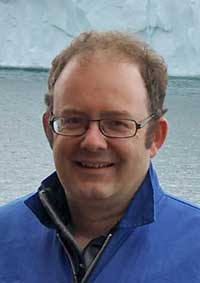Paleoceanography - Case Studies
Lecturers: Heiko Pälike
Elements of the Paleoceanographic proxy toolbox (obtaining and retrieving datasets from PANGAEA)
Interpreting contemporaneous CO2 and ocean proxies.
Interpreting global SST reconstructions
The sedimentological and micropaleontological contents of sediment cores (with Microscopy / smear slides)
d18O mass balance calculations
Calculations with d18O data from planktonic and benthic foraminifera
Applying paleoproductivity proxies from sediment cores
Analysing d13C and other proxy records to reconstruct ocean circulation
Data and Proxy analysis from the PETM
Time series analysis of paleoceanographic proxy data I (simple correlations, AnalySeries)
Advanced time series analysis (evolutive spectra)
Spatial coherence of high time resolution proxy records
Data and Proxy analysis from the Eocene/Oligocene climate transition
Open Topics and Revision
- Competency in applying the paleoproxy Toolbox and understanding their limitations
- mass balance calculations with respect to stable isotope measurements
- time series analysis
- case studies in major Cenozoic climate transitions
Summative assessment through written exam in parallel lecture course 05-BMG-PO1-1.
Formative assessment through exercise sheets.
Bearbeitung von Übungsaufgaben
1st SWS: Elements of the Paleoceanographic proxy toolbox (obtaining and retrieving datasets from PANGAEA)
2nd SWS: Interpreting contemporaneous CO2 and ocean proxies.
3rd SWS: Interpreting global SST reconstructions
4th SWS: The sedimentological and micropaleontological contents of sediment cores (with Microscopy / smear slides)
5th SWS: d18O mass balance calculations
6th SWS: Calculations with d18O data from planktonic and benthic foraminifera
7th SWS: Applying paleoproductivity proxies from sediment cores
8th SWS: Analysing d13C and other proxy records to reconstruct ocean circulation
9th SWS: Data and Proxy analysis from the PETM
10th SWS: Time series analysis of paleoceanographic proxy data I (simple correlations, AnalySeries)
11th SWS: Advanced time series analysis (evolutive spectra)
12th SWS: Spatial coherence of high time resolution proxy records
13th SWS: Data and Proxy analysis from the Eocene/Oligocene climate transition
14th SWS: Open Topics and Revision
Notebook-Pool, Tabellenkalkulation mit Excel, Binokular-Mikroskope
Basic Data
05-BMG-PO1-2
Study Program
Bachelor Marine Geosciences
Module Name
Paleoceanography and Environmental Change
Course Type
Exercise (E)
Second Year of Study
3 CP
2 SWS
Summer Term
Course Language
English
Contact Person

Paläozeanographie
Prof. Dr. Heiko Pälike
MARUM ZfT 5300R
Phone: +49 421 218 - 65980
hpaelike marum.de
marum.de
Paläozeanographie
Prof. Dr. Heiko Pälike
MARUM ZfT 5300R
Phone: +49 421 218 - 65980
hpaelike marum.de
marum.deLecturer

Paläozeanographie
Prof. Dr. Heiko Pälike
MARUM ZfT 5300R
Phone: +49 421 218 - 65980
hpaelike marum.de
marum.de
Paläozeanographie
Prof. Dr. Heiko Pälike
MARUM ZfT 5300R
Phone: +49 421 218 - 65980
hpaelike marum.de
marum.de
